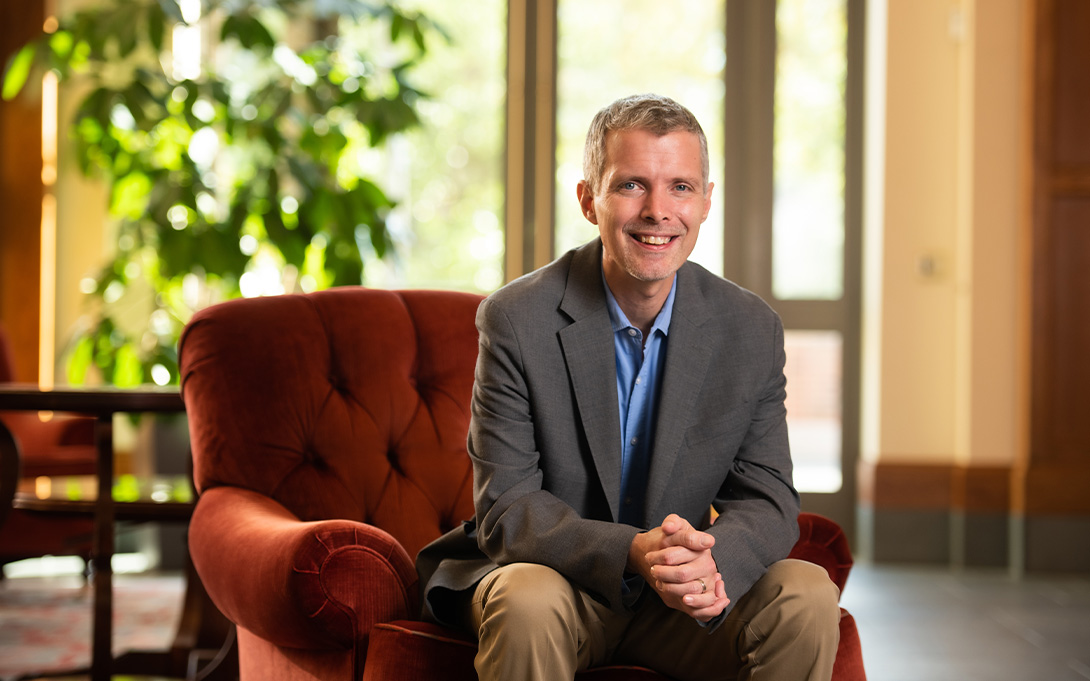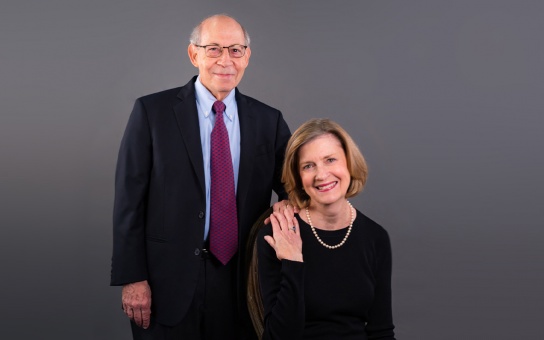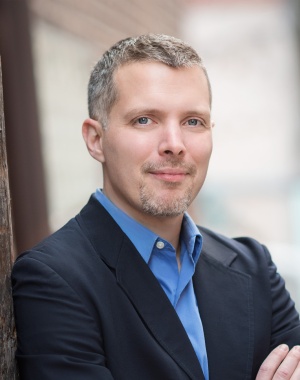
How Kohn Professor Luke Shaefer and the pandemic paved the way for an expanded Child Tax Credit
By Lauren Slagter
The passage of the American Rescue Plan Act in March ushered in a "euphoric" couple of weeks for Luke Shaefer, the Hermann and Amalie Kohn Professor of Social Justice and Social Policy.
"It was the most wonderful day of my professional life," said Shaefer, reflecting on the effectiveness of the federal safety net response to the pandemic, from the courtyard outside the Gerald R. Ford School of Public Policy on a late September morning. "I've just never been that giddy before."
The $1.9 trillion package provided support for people and businesses struggling to make ends meet amid the COVID-19 economic downturn. Closest to Shaefer's heart was a provision that expanded the Child Tax Credit to reach families who were not eligible before, increased the credit amount, and distributed half of the money as monthly payments rather than an annual lump sum.
Shaefer, director of U-M's Poverty Solutions initiative, spent the past five years discussing how an expanded Child Tax Credit that follows the design of a child allowance could reduce child poverty with people across the ideological spectrum. The work culminated in a 2018 journal article authored by Shaefer and nine colleagues that laid out a policy design vision, the dramatic effect it could have in reducing child poverty and virtually eliminating extreme poverty, and the cost of offering the benefit.
When the paper first circulated in early 2017, the idea was received as an interesting thought exercise by academics, Shaefer said. Over time, interest grew, and four years and a global pandemic later, the expanded Child Tax Credit became reality—for one year, at least.
"The idea had been gaining momentum for a while. Then a crisis hit and the speed at which things happen shifted," Shaefer said. "To me, this is a policy where we are standing up for kids and we're standing up for parents and saying, ‘We see you. We see how much work it is to raise kids today and we want to be there for you.'"
Families with low incomes report using the initial Child Tax Credit payments to help pay bills and cover other basic living expenses like rent or food. Many said they spent the money on child-related expenses like school supplies and children's clothing. Census Bureau research shows the expanded Child Tax Credit has already contributed to a decline in food hardship among families with children.
This type of policy change backed by rigorous academic research is exactly what Harold and Carol Kohn envisioned when they invested in the Ford School's work.
"An important objective of the Kohn Charitable Trust is to disrupt the disparities we see in education and health and to do it early in childhood," Carol and Harold Kohn wrote to State & Hill. "Luke Shaefer's important work on child poverty addresses this objective head on. In his recent testimony before Congress, Luke presented convincing data that show why the Child Tax Credit should be made permanent. This and other large issues will seed the work of the Kohn Collaborative for Social Policy."
Since 2018, Harold and Carol Kohn and the Kohn Charitable Trust have contributed $17 million to the Ford School. (See sidebar). In March 2020, Shaefer was awarded the first of five Kohn professorships, his named for Hermann and Amalie Kohn, Harold's grandparents, who were killed in the Holocaust. "The Kohns' amazing investment seeks to support rigorous, deep scholarship and teaching, but also a focus on connecting that to the real world, with a focus on impact. And that's what I am trying to live out in my work," Shaefer said.
Shaefer's earliest conversations with the Kohns focused on the idea of a child allowance to address the challenges he wrote about in $2 a Day: Living on Almost Nothing in America, the 2015 book he coauthored with sociologist Kathryn Edin. A March 2021 New York Times article referenced "$2 a Day" as fundamental to the anti-poverty policy shift enacted by the American Rescue Plan Act. Time magazine has similarly recognized the book's impact.
"We wrote about the importance of dignity," Shaefer said. "Our old cash welfare program was really very stigmatizing. We had no intention of returning to the way we did things in the past. But we did think a cash safety net really mattered."
An expanded Child Tax Credit with monthly payments is part of the solution. Informed by Shaefer and his colleagues, The American Families Act, introduced in the U.S. Senate in 2017 and 2019, garnered support for the idea and set the table for the current version of the expanded Child Tax Credit. Throughout the pandemic, Shaefer and Patrick Cooney (MPP ‘11), assistant director of policy impact at Poverty Solutions, have continued to track the impact of cash aid— in the form of stimulus checks, unemployment benefits, and now Child Tax Credit payments—on people's ability to afford basic necessities like food and housing.
"We're only a few months in, but so far the evidence is very positive about the impacts," Shaefer said. "This is hands down the best we've ever done in supporting families struggling during a major economic crisis." Now, the question is whether the expanded Child Tax Credit will become permanent; the Biden administration has proposed extending it through 2025.
The Kohn Collaborative for Social Policy

Since 2018, Harold and Carol Kohn and the Kohn Charitable Trust have given a total of $17 million to the Ford School to establish the Kohn Collaborative for Social Policy. This transformative gift expands the scope and impact of the Ford School’s long-standing strength in social policy, catalyzing interdisciplinary research on policy that promotes social equity and inclusion for all U.S. residents. It includes:
- Five Kohn Professors. The heart of the collaborative is a cohort of preeminent scholars who together will tackle structural inequalities and improve lives—while training the next generation of leaders in social policy.
- The Hermann and Amalie Kohn Professorship of Social Justice and Social Policy is currently held by Luke Shaefer.
- The Karl and Martha Kohn Professorship of Social Policy will advance societal equity and inclusion in the United States.
- The Arlene Susan Kohn Professorship of Social Policy will address the rights of people with disabilities in the United States.
- The Carol Kakalec Kohn Professorship will promote social equity through U.S. education policy, with a potential focus on childhood development.
- The Harold Kohn Professorship will support applied research in U.S. economic policy that advances social equity and inclusion.
- Two Kohn Scholars, as part of the Ford School’s partnership to support Rackham Master’s Awards. The inaugural Kohn Scholar is Marco Ramirez (MPP ‘23), who is passionate about health policy.
- The collaborative will also support seed grants and the dissemination, networking, and advocacy work required to produce lasting policy impact.
More in State & Hill
Below, find the full, formatted fall 2021 edition of State & Hill. Click here to return to the fall 2021 State & Hill homepage.

